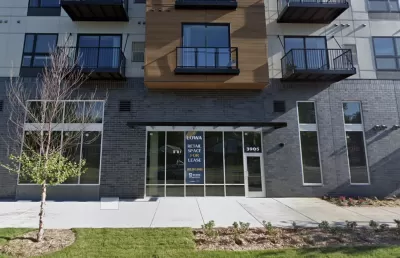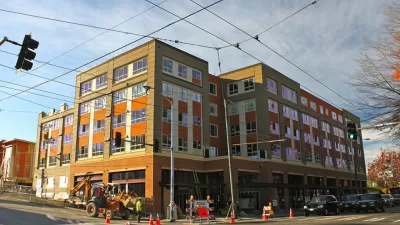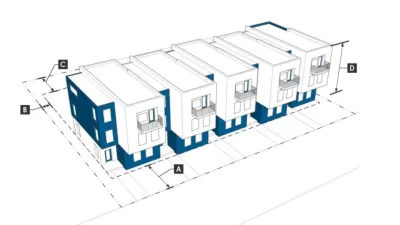Minneapolis developers are agitating against the requirements of mixed-use zoning, saying that it's impossible to find a good tenant for ground floor retail these days.

"Curt Gunsbury wants to replace a vacant parking lot and auto repair shop in northeast Minneapolis with a seven-story apartment building," according to an article by Jim Buchta and Dee DePass, but there's a catch. "City zoning rules say that because the site is in a commercial zone he’s required to devote a portion of the building to storefronts. Gunsbury says prospects to fill that space are dim."
Gunsbury points to empty storefronts on the blocks near the proposed developments as evidence of the difficulties of filling any ground floor retail, and also says that empty retail space is passed on to apartment tenants in the cost of higher rents.
"So Gunsbury plans to ask the city for permission to replace some of that required commercial space with walk-up apartments, which are easier to fill than retail," report Buchta and DePass.
According to the article, Gunsbury is far from alone. "With rising commercial vacancy rates in the Twin Cities, developers are imploring city planners to let them build more apartment units on the street level where commercial space is now required. While planning departments try to make cities more livable with such mixed-use projects, developers argue vacant commercial space increases rents at a time when renters can least afford it. Plus lenders are less willing to finance such projects."
Mixed-use development is desired by planners for its benefits in creating walkable, urban neighborhoods, and according to this article, the concept still has political support. Minneapolis City Council Member Andrew Johnson, for example, is quoted in the article saying developers should reevaluate their commercial rents and place smaller, independent retailers in some of the vacant spaces.
Jeffrey Herman, president of Urban Anthology Commercial Real Estate in Minneapolis, is quoted in the article arguing that COVID-19 is gutting urban commercial markets, in Minneapolis and elsewhere. Not coincidentally, Conor Dougherty and Peter Eavis wrote an article in June 2020 making a similar case, but for the real estate market in New York City.
FULL STORY: 'Nobody wants it.' Twin Cities developers push back on mandated storefronts in apartment buidings

Alabama: Trump Terminates Settlements for Black Communities Harmed By Raw Sewage
Trump deemed the landmark civil rights agreement “illegal DEI and environmental justice policy.”

Study: Maui’s Plan to Convert Vacation Rentals to Long-Term Housing Could Cause Nearly $1 Billion Economic Loss
The plan would reduce visitor accommodation by 25% resulting in 1,900 jobs lost.

Planetizen Federal Action Tracker
A weekly monitor of how Trump’s orders and actions are impacting planners and planning in America.

Federal Homelessness Agency Places Entire Staff on Leave
The U.S. Interagency Council on Homelessness is the only federal agency dedicated to preventing and ending homelessness.

Restoring Northern India’s Himalayan ‘Water Temples’
Thousands of centuries-old buildings protect the region’s natural springs and serve as community wells and gathering places.

Milwaukee to Double Bike Share Stations
Bublr Bikes, one of the nation’s most successful, will add 500 new e-bikes to its system.
Urban Design for Planners 1: Software Tools
This six-course series explores essential urban design concepts using open source software and equips planners with the tools they need to participate fully in the urban design process.
Planning for Universal Design
Learn the tools for implementing Universal Design in planning regulations.
Caltrans
Smith Gee Studio
Institute for Housing and Urban Development Studies (IHS)
City of Grandview
Harvard GSD Executive Education
Toledo-Lucas County Plan Commissions
Salt Lake City
NYU Wagner Graduate School of Public Service





























